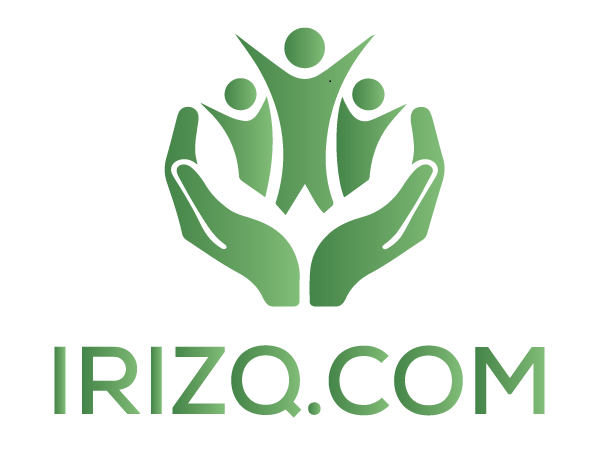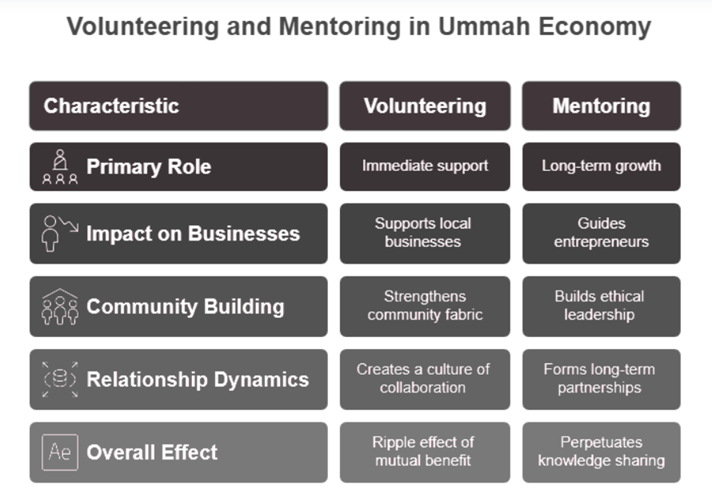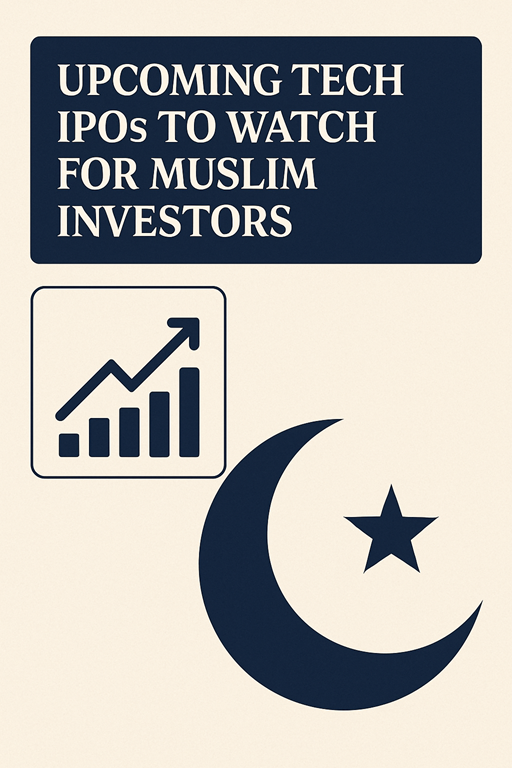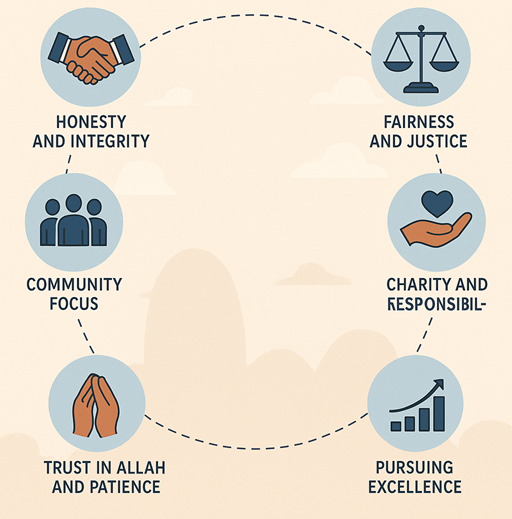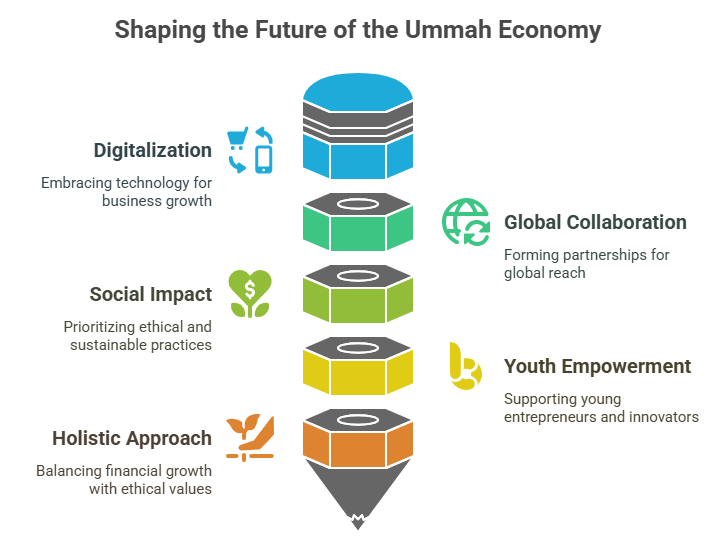In a values-driven economy, volunteering and mentoring are powerful, often overlooked forces that empower halal businesses, uplift future leaders, and strengthen the Muslim community through collective support and ethical growth.
Bismillah!
In a rapidly evolving world where economic success often feels disconnected from communal well-being, the concept of the Ummah Economy stands as a powerful reminder of how collaboration, mutual support, and shared values can transform communities. While business practices, investments, and ethical commerce play crucial roles in building a thriving Ummah Economy, there is another vital element that often goes overlooked, volunteering and mentoring.
These two forces are not only essential for strengthening the community but are foundational in creating a sustainable, self-sufficient economy that empowers Muslims worldwide. By giving their time, knowledge, and skills, volunteers and mentors contribute to the growth of halal businesses, uplift future generations, and create an environment where everyone thrives. Let’s explore how volunteering and mentoring can drive the Ummah Economy forward.
The Power of Volunteering in the Ummah Economy
Volunteering is an act of selflessness that holds immense power in shaping and uplifting communities. When Muslims volunteer their time, whether for social causes, community projects, or local businesses, they contribute to building the collective strength of the Ummah. Volunteering in the Ummah Economy goes beyond charity work, it’s about creating a culture of collaboration and shared responsibility that strengthens both the individual and the community.
Supporting Local Businesses and Social Causes
Volunteers play an essential role in supporting halal businesses by offering their time and skills to help them grow. For example, someone with a background in marketing or digital media can volunteer their services to help a small business reach a wider audience. Others may volunteer their expertise in finance, legal advice, or management, assisting Muslim entrepreneurs in making informed business decisions and avoiding costly mistakes.
Additionally, volunteers can help charities and social enterprises by organizing events, campaigns, and fundraising efforts. By volunteering their time to support causes like Islamic education, charitable foundations, or community development, Muslims create an environment where resources are distributed more equitably, and everyone has a chance to benefit from the collective success.
Building Trust and Strengthening the Community Fabric
Volunteering fosters a sense of solidarity within the community. When people come together to help others without expecting anything in return, it strengthens the fabric of trust and mutual support that the Ummah is built upon. This creates an interconnected ecosystem where businesses, individuals, and organizations can rely on one another for help, guidance, and support.
By investing time in volunteering, we are also sending a message to others that success is not just about individual wealth, it’s about shared prosperity. When volunteers come forward, they demonstrate that each person has a role to play in building a thriving community, and together, we can overcome challenges and reach greater heights.
The Importance of Mentoring in the Ummah Economy
Mentoring is another crucial tool for developing the Ummah Economy. While volunteering provides immediate support, mentoring ensures the long-term growth of individuals and businesses within the community. A mentor is someone who shares their experience, knowledge, and wisdom with others to guide them on their personal and professional journeys.
Guiding Future Entrepreneurs and Professionals
In the context of the Ummah Economy, mentoring can have a profound impact on the next generation of Muslim entrepreneurs. When established business owners and professionals mentor younger Muslims, they pass on valuable lessons about entrepreneurship, leadership, and ethical business practices. These lessons are invaluable as they provide mentees with the tools and confidence they need to navigate the complexities of the business world.
A mentor doesn’t just offer advice; they help mentees build networks, make connections, and offer practical guidance that allows them to avoid common mistakes and pitfalls. For example, a mentor might guide a new business owner through the process of creating a business plan, securing funding, or navigating challenges such as marketing or customer acquisition.
Fostering Ethical Leadership and Community Values
One of the key components of the Ummah Economy is ethical leadership. Through mentoring, experienced leaders can instill core Islamic values, such as honesty, justice, integrity, and fairness, in the next generation of business owners and community leaders. This ensures that future entrepreneurs and professionals uphold these values in their work, contributing to a broader culture of ethical business practices within the Muslim community.
Mentoring helps reinforce the idea that economic success should not come at the expense of moral responsibility. By nurturing ethical leadership, mentors help shape a future where businesses don’t just focus on profit but also on social impact, fairness, and the well-being of the community.
Building Long-Term Relationships and Networks
Another key benefit of mentoring is the long-term relationships it creates. Mentorship is not just about one-off advice or guidance; it’s about forming lasting partnerships that can continue to provide value over the years. These relationships form a foundation of trust, respect, and cooperation that help foster strong networks within the Ummah. As businesses grow and develop, the mentorship relationships can evolve into partnerships that benefit both parties, creating opportunities for collaboration, investment, and mutual growth.
The Ripple Effect: Volunteering and Mentoring Beyond the Individual
Both volunteering and mentoring have a ripple effect that extends beyond the individuals directly involved. When one person volunteers or mentors another, the impact goes far beyond the initial exchange, it spreads throughout the entire community.
Mutual Benefit and Collective Growth
When a business benefits from the time and expertise of a volunteer, that business can then hire more employees, increase its offerings, or expand into new markets. This, in turn, creates more job opportunities, boosts local economies, and supports further charitable causes. In the same way, a mentee who receives guidance and advice from a mentor can become a mentor themselves in the future, perpetuating the cycle of knowledge-sharing and community empowerment.
Ultimately, volunteering and mentoring aren’t just individual acts, they are investments in the future of the entire community. They lay the groundwork for lasting growth, economic stability, and social well-being that extends to all members of the Ummah.
A Collective Effort Towards a Prosperous Future
Volunteering and mentoring play an integral role in building the Ummah Economy. By contributing time, knowledge, and expertise, we are not only helping individual businesses and professionals succeed, but also creating a network of support that nurtures the community as a whole. These acts of generosity have a ripple effect, strengthening both the economic and social fabric of the Ummah, making it a resilient, thriving entity.
As we continue to invest in each other’s success whether through volunteering our time or mentoring the next generation, we move closer to realizing a virtuous economy that reflects the values of unity, fairness, and collective growth. By embracing the power of volunteering and mentoring, we can create an Ummah Economy where everyone rises together, empowered to succeed and uplift others.
